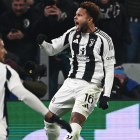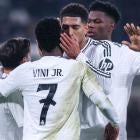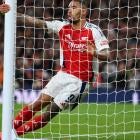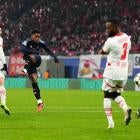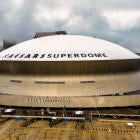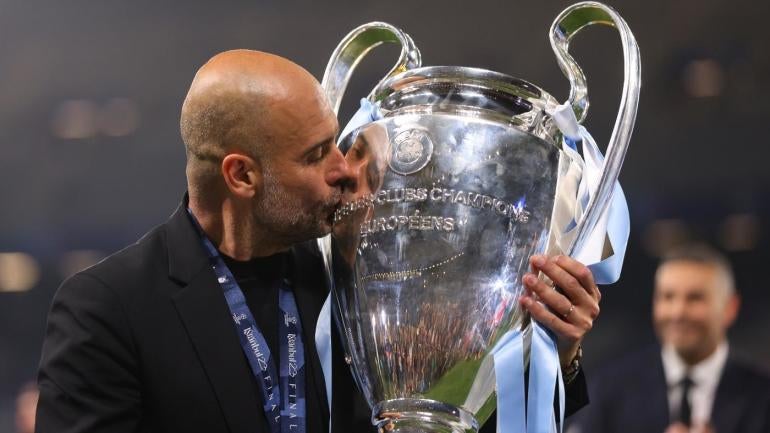
John Stones jinks and feints. Drawing two Inter defenders in his direction, he eases the ball out from under his feet, working for that scintilla of space for a pass or a shot. For a center back, this was something quite magnificent. For a center back.
That rather typifies the night Manchester City entered the echelon of Europe's greatest sides. Only the best of the best win their league, domestic cup and the Champions League. For so many -- Bayern Munich in 2013, Manchester United in 1999 -- the final step is the toughest of all. None, however, have matched City's ability to make it so much more difficult for themselves than it needed to be.
Inter were an obdurate, energetic opponent who took a masochistic joy in letting City have the ball, their man-to-man press discombobulating their opposition in the early stages. When Ederson and his defenders wavered in possession, Simone Inzaghi's men pounced. Lautaro Martinez had Pep Guardiola on his knees only for the Argentine's decision-making to let him down. At the death, they even had the chances they so infrequently forged for themselves beforehand, Romelu Lukaku awfully unlucky to find himself the fall guy.
Don't let the two expected goals they ended up with confuse you though. Against Serie A opposition Inter have proven themselves to be a dangerous opponent but at the highest level, there was a gulf between them and City. What Simone Inzaghi's side did well was plug that space with mulch, muddying up a contest that was never played at a tempo that suited the favorites. This was, by the standards of the European elite, an ordinary team doing extraordinary work in forcing the game to be played in a way that suited them.
Inter's pressure forced mistakes from City. So did the nerves of the European champions. Guardiola certainly seemed to believe that was the case, continually urging his players to "relax" throughout the first half. And yet perhaps the most convincing explanation for City's tough road to glory tonight was that yet again they or their manager made matters far more difficult than was necessary.
City had a complex plan that they've executed to perfection for months on end, one that involves Stones stepping out from defense to aid Rodri, an assertive double pivot that blocks out counter attacks and offers the playmakers ahead of them someone to dovetail with and bounce the ball off. What City's plan did not involve was a repurposed center back operating as something akin to a right-sided attacking midfielder, the free eight that was once David Silva now handed over to a man once labelled the next Bobby Moore. Having been pilloried for starting a one-man midfield without Rodri on this stage two years ago, Guardiola responded by starting a one-man midfield with Rodri.
Here's how the team's passing network looked, and note how high up Stones was and how far on the right (No. 5):
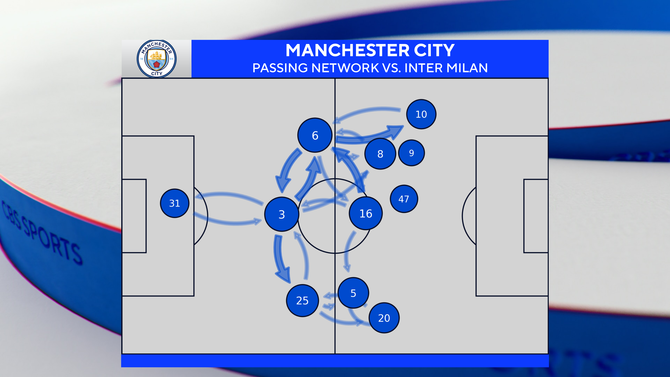
You could see a logic to what Pep Guardiola was planning. Bernardo Silva drops deep out of the front three. Alessandro Bastoni follows. The space those two have left behind is filled by overlapping Stones, quite possibly drawing another center back out to deal with him. Suddenly, without Inter noticing it, Erling Haaland is one against one. Gulp.
It just did not work from minute one to minute 90. Inter's back three were more than prepared to sit deep; between them and the ball were seven teammates more than ready to do anything fair or foul to slow the sky-blue tide. When the Inter press came early on City always seemed short one extra pass, Ederson in particular, forced into the sort of nervy clearances that very rarely rear their head at this stage of the season. When Kevin De Bruyne departed in the first half everything became more complicated. His replacement, Phil Foden, was looking to stretch in behind, Jack Grealish and Bernardo were stretching the pitch wide and no one was occupying the most dangerous areas of the Inter third. Into the breach, John Stones.
None of this is to say that Stones was anything less than sensational. One minute he would be bombing beyond Bernardo, attempting to ping crosses into the box, the next tracking Federico Dimarco back to his own third. He did everything his coach could have asked of him and more, much of which seemed to come after De Bruyne's exit. Surely that was too much though? Everything was a little too complicated, it's just that this time City were good enough to overcome their own foibles.
Tonight, City didn't need to dominate the game, they just needed their moments. Haaland sliced through in the first half, Foden in the second, both putting their shots too close to the excellent Andre Onana. When Bernardo had the chance to get at Dimarco, the Italian had no answer. The cutting edge might not have come from their exceptional attackers but Rodri's precise finish in the 68th minute reflected a team who take full advantage of their most dominant periods. In their most dominant periods they made it tell, at the other end it rather helps when Ruben Dias is a vortex that sucks all shots in his general direction.
Had this night ended how some predicted beforehand, in a shellacking of Inter by the bookmakers' overwhelming favorites, then who could have blamed City's rivals if they had feared the worst, that this was just the start of an era of dominance for a team headlined by the relatively youthful Haaland, Dias and Rodri. In many ways, this is a more concerning outcome for European football. On the biggest stage, the team with the most money, the best squad and the greatest coach of his generation can freeze under the lights, run into an opponent that tests them physically and tactically and lose their best player in the first half. To add to all that, they can keep persevering with a tactical plan that really does not seem to bring out the best in them. All those game-wrecking events can transpire ... and City still win.








